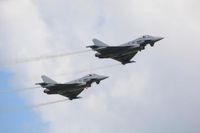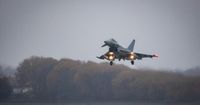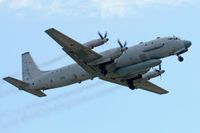On March 27, 2025, the German Air Force successfully intercepted a Russian reconnaissance aircraft, an IL-20 model, over the Baltic Sea. This incident underscores the rising geopolitical tensions in the region as military activities increase amid international uncertainty.
The reconnaissance aircraft approached German airspace without an activated transponder, a critical device used for identification purposes. This lack of communication posed a significant risk to civil aviation, prompting a swift response from the German military.
Two Eurofighter jets were scrambled from the Rostock-Laage airbase to address the unidentified aircraft. According to a statement from the German Air Force, the Quick Reaction Aircraft (QRA) system was activated due to the presence of the unknown aircraft flying over the Baltic Sea without a flight plan.
Eyewitness reports indicated that the Russian IL-20 was first spotted east of the island of Rügen. As it neared the German border, the urgency of the situation became clear, leading to the deployment of the Eurofighter jets. The German Air Force acted decisively to ensure the safety and integrity of its airspace.
After being intercepted, the IL-20 changed direction and flew back towards Kaliningrad, a Russian exclave on the Baltic coast. The aircraft's return to Kaliningrad marked the conclusion of a tense encounter that highlighted the complexities of airspace security in Europe.
Incidents involving Russian reconnaissance aircraft approaching German airspace are not uncommon. The German media have noted that such occurrences have been rising, prompting NATO countries, including Germany, to maintain a vigilant stance with rapid response systems like the QRA.
The QRA system is designed to enable quick responses to potential aerial threats, ensuring that any unidentified aircraft can be dealt with swiftly. In this case, the German Air Force's prompt action prevented any potential escalation of the situation.
As military activities in Europe continue to increase, the importance of airspace security remains paramount. The interception of the IL-20 serves as a reminder of the delicate balance of power in the region and the ongoing need for vigilance in the face of evolving threats.
In the broader context, the rising tensions in Eastern Europe are reflective of the complex geopolitical landscape shaped by various factors, including military exercises, territorial disputes, and international relations. The presence of Russian military aircraft near NATO borders has been a point of contention and concern for many countries in the alliance.
Germany's response to the IL-20 incident illustrates its commitment to safeguarding its airspace and upholding NATO's collective defense principles. The rapid deployment of Eurofighter jets exemplifies the readiness of the German military to respond to potential threats, reinforcing the need for cooperation among NATO allies in addressing security challenges.
Looking ahead, the situation in Eastern Europe remains fluid, with ongoing discussions about military readiness and strategic posturing among NATO member states. The interception of the Russian reconnaissance aircraft is just one of many incidents that highlight the importance of maintaining robust defense capabilities in the face of evolving geopolitical dynamics.
As tensions continue to simmer, the international community watches closely, aware that each incident can have far-reaching implications for regional stability and security. The need for dialogue and diplomatic solutions remains crucial in navigating these complex challenges.
The interception of the IL-20 by the German Air Force serves as a critical reminder of the ongoing need for vigilance and preparedness in maintaining airspace security. With military activities on the rise, the importance of rapid response mechanisms like the QRA cannot be overstated.
In conclusion, the interception of the Russian IL-20 reconnaissance aircraft is a significant event that underscores the complexities of airspace security and the geopolitical tensions in Eastern Europe. As military activities increase, the need for cooperation and readiness among NATO allies will remain paramount in ensuring the safety and integrity of the region's airspace.






